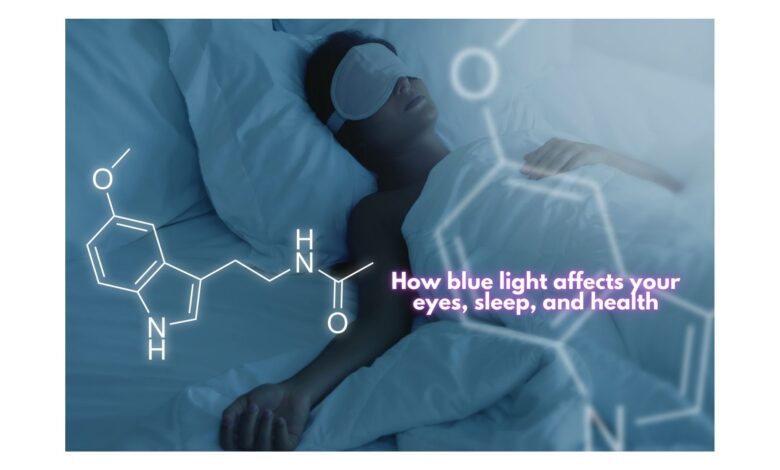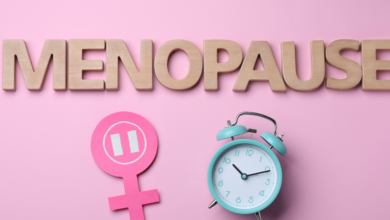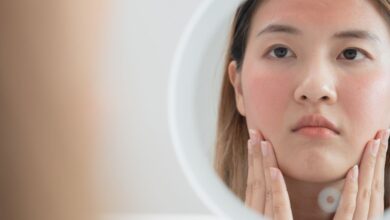
Blue light affects our daily lives in various ways. From disrupting our sleep patterns to causing digital eye strain, its impact is significant. Therefore, it is crucial to take necessary measures to minimize our exposure to blue light, such as using blue light filters on devices and practicing proper sleep hygiene.
In today’s digital age, most of us spend hours daily in front of electronic devices, such as TVs, smartphones, tablets, and computers. But how does the blue light emitted by these screens impact our health? Let’s explore its effects on our eyes, sleep, and overall well-being.
What Is Blue Light?
Blue light is a part of the visible light spectrum, with wavelengths between 380 to 500 nanometers, making it the shortest and most energetic type of visible light.
- Natural Sources: The sun is the primary source of blue light.
- Artificial Sources: Fluorescent lights, LED TVs, smartphones, tablets, and computer screens are common sources.
Approximately one-third of all visible light is blue light.
Health Benefits of Blue Light
While blue light often gets a bad reputation, it also has some essential benefits:
- Boosts Alertness: Helps improve focus and concentration.
- Enhances Mood: Positively affects mental health.
- Regulates Circadian Rhythm: Plays a vital role in maintaining your body’s natural sleep-wake cycle.
- Supports Eye Development: Sunlight, a natural source of blue light, aids children’s vision and eye growth.
How Harmful Is Blue Light?
Though blue light exposure from screens is minimal compared to sunlight, excessive screen time can lead to:
Digital Eye Strain
- Symptoms: Dry eyes, headaches, blurred vision, and neck or shoulder pain.
- Statistics:
- 80% of American adults use digital devices for over 2 hours daily.
- 59% report symptoms of digital eye strain after prolonged screen use.
Long-Term Eye Damage
- Blue light passes through the cornea and lens, reaching the retina. Prolonged exposure can contribute to:
- Age-related macular degeneration
- Cataracts and eye cancer
- Growths on the eye’s surface
Impact on Children
Children are more vulnerable since their eyes absorb more blue light from digital devices compared to adults.
How Does Blue Light Affect Sleep?
Blue light exposure, especially before bedtime, suppresses the production of melatonin, a hormone that regulates sleep. This disruption in your circadian rhythm can contribute to:
- Sleep disorders
- Cognitive dysfunction
- Increased risk of:
- Type 2 diabetes
- Heart disease
- Cancer
Can blue light glasses help you sleep ?
What Are Blue Light Glasses?
These glasses are designed to filter blue light and reduce its negative effects.
Effectiveness
- Studies Are Mixed: While research is inconclusive, many users find relief from digital eye strain by wearing blue light glasses.
- Sleep Benefits: Wearing them during the day may improve sleep quality by reducing exposure to blue light.
Should You Use Them?
If you spend significant time on digital devices and experience eye strain, blue light glasses could be a worthwhile investment.
Tips to Minimize Blue Light’s Negative Effects
- Use Blue Light Filters
- Install screen filters for smartphones, tablets, and computers to block blue light without affecting display clarity.
- Follow the 20-20-20 Rule
- Every 20 minutes, take a 20-second break to look at something 20 feet away.
- Adjust Lighting
- Optimize room and screen lighting to reduce glare and strain.
- Maintain Proper Posture
- Set up a comfortable working distance and ergonomic posture while using screens.
- Visit Your Eye Doctor
- Regular eye exams can help address vision issues and discuss blue light protection options.
Key Takeaways
- Moderation Is Key: Limit screen time to reduce digital eye strain and improve sleep.
- Consider Blue Light Glasses: They may help reduce discomfort and enhance sleep quality.
- Practice Good Habits: Follow the 20-20-20 rule, adjust lighting, and maintain ergonomic posture.
- Consult Professionals: Talk to your eye doctor about personalized solutions.
FAQs
1. Is blue light exposure always harmful?
No, moderate blue light exposure has benefits, such as boosting alertness and regulating the sleep-wake cycle.
2. Do blue light glasses work for everyone?
Results vary, but many people find relief from digital eye strain and improved sleep quality.
3. Can children wear blue light glasses?
Yes, especially if they spend long hours using digital devices.
Conclusion
Blue light, while essential in small amounts, can negatively impact your eyes, sleep, and health with excessive exposure. By adopting protective measures and consulting eye care professionals, you can enjoy your digital devices without compromising your well-being.



